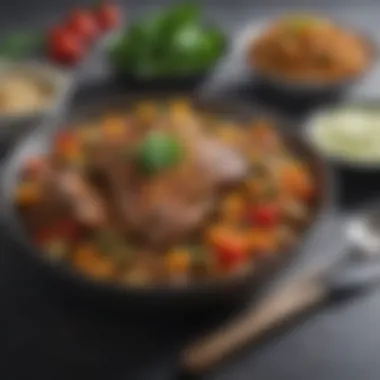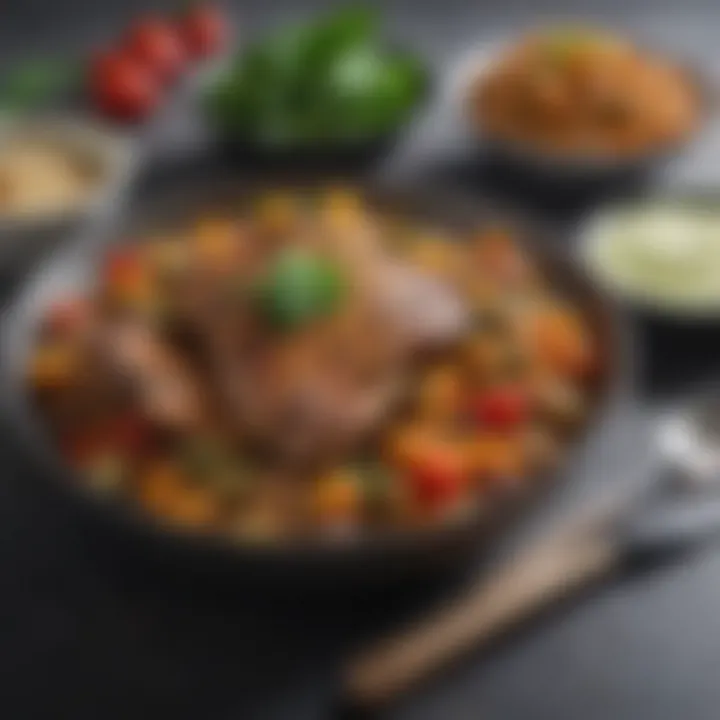Three-Week Vegan Weight Loss Plan for Effective Results


Intro
In recent years, plant-based diets have gained popularity among individuals seeking to improve their health and manage their weight effectively. The three-week vegan weight loss plan presents a structured approach to adopting a vegan lifestyle while focusing on weight loss. It is essential to understand the core components of this plan, as they are pivotal for achieving health goals. This comprehensive guide outlines meal planning, nutritional strategies, exercise recommendations, and lifestyle adjustments necessary for success.
Key Takeaways
- A three-week vegan weight loss plan focuses on incorporating whole-food plant-based meals, reducing caloric intake, and maximizing nutrient density.
- Nutritional considerations include understanding macros, micronutrients, and the importance of adequate protein sources like legumes, nuts, and seeds.
- Exercise is key to effective weight loss, providing both calorie burn and muscle maintenance. Incorporating both cardio and strength training into the routine is practical.
- Lifestyle modifications can ease the transition to veganism, addressing common challenges like cravings, social situations, and nutritional deficiencies.
Summary of the primary points covered in the article
The following points will be examined:
- The importance of meal planning and preparation.
- Nutritional analysis of a vegan diet.
- Recommendations for physical activity.
- Insights on overcoming challenges when shifting to a vegan diet.
Key statistics or facts related to the topic
- Research shows that a vegan diet can lead to weight loss of 5-10% of body weight over a three-month period.
- A plant-based diet is linked to lower body mass indexes and decreased levels of obesity-related diseases.
Practical Tips
Adopting a vegan weight loss plan requires actionable steps to make the transition smoother and more effective. Here are some practical tips:
- Create a meal plan: This strategy minimizes impulsive eating and helps ensure balanced nutrition. Aim to include a variety of colorful vegetables, grains, and plant proteins in your meals.
- Read food labels: Understanding what goes into your food can help in making healthier choices. Look for hidden sugars, unhealthy fats, and high-calorie ingredients.
- Gradually adjust your palate: Introduce vegan foods slowly, allowing your taste buds to adapt. This can reduce the shock of a sudden diet change.
- Stay hydrated: Drinking enough water supports metabolism and helps control hunger. Aim for at least eight glasses a day.
- Incorporate regular exercise: Schedule workouts that include both cardio and strength training. Consistency is crucial to achieving weight loss goals.
Incorporate these tips into daily routines. By understanding the principles behind this three-week vegan weight loss plan, readers can set themselves on a path to successful weight management and improved overall health.
Prolusion to Vegan Weight Loss
Vegan weight loss has become a significant topic in recent years, spurred by an increasing desire for healthier lifestyles and more ethical choices. This article addresses the fundamental aspects of adopting a vegan diet specifically designed to facilitate weight reduction. The importance of a structured weight loss plan cannot be overstated. An organized approach not only sets clear pathways for achieving goals but also fosters long-term adherence. This guide will highlight ways to integrate plant-based meals, exercise, and mindfulness practices into daily life, making the transition to veganism both manageable and successful.
The Rise of Veganism in Weight Management
As awareness regarding health and environmental issues grows, so does the popularity of veganism. For many, this dietary shift is a proactive measure to manage weight effectively. Research indicates that individuals following a vegan diet often consume more fruits and vegetables, leading to increased fiber intake and reduced calorie consumption.
This dietary pattern is not just a fleeting trend. Many health professionals advocate for plant-based diets as a method for sustainable weight loss. According to various studies, vegans tend to have lower body mass indexes (BMIs) compared to non-vegans. This is particularly important considering the rising obesity rates globally. It suggests that adopting a vegan diet, when combined with mindful eating practices, can yield substantial benefits.
Understanding the Vegan Diet
To embark on a successful vegan weight loss journey, it is crucial to understand what a vegan diet entails. At its core, veganism excludes all animal products. This includes not just meat but also dairy, eggs, and, in some cases, honey. Instead, the focus shifts to plant-based foods such as:
- Fruits and vegetables
- Legumes
- Grains
- Nuts and seeds
The key to a thriving vegan diet lies in balance. While it is easy to consume processed vegan products, a whole foods approach is often more beneficial. Whole foods provide essential nutrients without excessive calories, ensuring individuals meet their dietary needs while losing weight.
A successful vegan diet integrates a variety of foods to cover all macronutrient needs. Individuals should be mindful of protein sources. Legumes, quinoa, nuts, and seeds play important roles in meeting daily protein requirements. Fiber from fruits and vegetables not only aids digestion but also contributes to feelings of fullness, making it easier to maintain a caloric deficit for weight loss.
A well-planned vegan diet is both nutritionally adequate and delicious, making weight loss a journey worth pursuing rather than a challenge to face.
Principles of Weight Loss
Understanding the principles of weight loss is crucial when embarking on a vegan weight loss journey. Weight loss fundamentally operates on the concept of energy balance, which means the calories consumed must be fewer than the calories expended. By grasping this concept, individuals can better prepare themselves to make informed dietary choices that align with their weight loss goals. This segment focuses on two fundamental aspects: caloric deficit and macronutrient balance.
Caloric Deficit Explained
A caloric deficit occurs when the number of calories burned exceeds the number of calories taken in. This is the cornerstone of weight reduction.
To create a caloric deficit, one can either reduce caloric intake through dietary changes or increase caloric expenditure via physical activity. For those on a vegan diet, it is important to choose nutrient-dense foods that provide essential vitamins and minerals while still being low in calories. Vegetables like spinach and broccoli are excellent options. These foods allow individuals to consume larger portions without exceeding their caloric limits.
It is generally recommended to aim for a deficit of 500 to 1000 calories per day, which can result in a healthy weight loss of about one to two pounds per week. Regularly tracking food intake and exercise can help maintain awareness about caloric balance. Ultimately, achieving and sustaining a caloric deficit is vital for successful weight loss.
Macronutrient Balance
A well-rounded diet requires attention to the three main macronutrients: proteins, carbohydrates, and fats. To maximize weight loss and support overall health on a vegan diet, individuals must balance these macronutrients effectively.


Proteins
Proteins are essential in muscle preservation, especially during weight loss. Unlike the other macronutrients, proteins have a higher thermic effect, meaning that they require more energy for digestion compared to fats and carbohydrates.
A key characteristic of proteins is their role in satiety. Including adequate protein in meals can help keep appetite at bay and reduce overall calorie consumption. Popular plant-based sources include lentils, chickpeas, and quinoa. While proteins are advantageous for muscle maintenance, one should be mindful of the amino acid profile in vegan sources, ensuring a mix of different plant proteins for balanced intake.
Carbohydrates
Carbohydrates serve as the primary energy source for the body. They are crucial for fueling exercises and daily activities. On a vegan weight loss plan, the focus should be on complex carbohydrates like whole grains, fruits, and vegetables, which provide not only energy but also necessary fiber and nutrients.
The key characteristic of carbohydrates is their ability to quickly provide energy. However, it is essential to choose low glycemic index options to avoid spikes in blood sugar, which can lead to subsequent cravings. Whole foods are crucial here, as they offer sustained energy without excessive calories.
Fats
Fats play an important role in hormone regulation and nutrient absorption. They can also contribute to feelings of fullness, which is important for managing hunger on a diet. Healthy fats, like those found in avocados, nuts, and seeds, are essential as they provide essential fatty acids.
A noteworthy feature of fats is their higher calorie density compared to proteins and carbohydrates. This means that moderation is key when incorporating fats into a meal plan. While fats are beneficial, excessive intake can hinder weight loss efforts if not managed properly.
Adequate knowledge of caloric deficit and macronutrients can significantly enhance the efficacy of a vegan weight loss plan.
Ultimately, the principles of weight loss hinge on understanding how to integrate these elements cohesively. Balancing caloric intake and macronutrients will set a solid foundation for anyone aiming for significant weight loss through a vegan diet.
Week One: Initial Adjustments
The first week of any weight loss plan is critical. It sets the pace and tone for the journey ahead. In the context of a vegan diet, initial adjustments can be particularly significant. Transitioning to veganism often requires changes to not only food choices but also habits and mindsets around eating. This week helps build a foundation. By focusing on realistic goals, laying out meal planning basics, and understanding a sample meal plan, individuals can approach their new diet more confidently and structurally.
Setting Realistic Goals
Setting realistic goals is essential for sustainable weight loss. Goals should be specific, measurable, achievable, relevant, and time-bound. They provide direction, helping to keep individuals motivated. Unrealistic expectations can lead to disappointment and frustration. For instance, aiming to lose ten pounds in one week often leads to unhealthy practices like extreme caloric restriction. Instead, a target of one to two pounds per week is safer and more achievable. Take time to write down these goals and reflect on them frequently. Goals can evolve over time, especially as one learns more about their body’s response to a vegan diet.
Meal Planning Basics
Effective meal planning can ease the transition to a vegan lifestyle. It involves more than merely deciding what to eat. It requires foresight and organization. A well-planned week can prevent impulsive food choices that lead to weight gain. Planning meals allows individuals to balance nutrients and ensure variety. The next two subsections highlight how two vital parts of meal planning contribute to a successful start.
Creating a Shopping List
Creating a shopping list is a practical step that enhances planning. It helps focus on healthy ingredients while shopping, reducing the likelihood of impulse buys. Including seasonal and fresh items can also improve meal diversity. A well-structured shopping list is typically organized by food category. Main categories might include fruits, vegetables, grains, proteins, and pantry staples. Having it on hand can save time and ensure that all necessary ingredients are collected for the week. This habit not only promotes healthier eating but also encourages mindful shopping practices.
Essential Pantry Staples
Essential pantry staples form the backbone of any vegan cooking endeavor. Stocking a variety of bases is beneficial. Items like lentils, beans, quinoa, oats, and various spices can be the foundation of numerous meals. These staples provide essential nutrients and flavors that can enhance the overall appeal of vegan food. Accessibility to these items can significantly ease meal preparation during the week. Some might find it challenging to adapt to a new ingredient selection. However, building a well-stocked pantry encourages creativity in meal-making.
Sample Meal Plan for Week One
A sample meal plan provides clarity on practical implementation. It's important to outline options that incorporate a range of flavors and nutrients while sticking to the principles of veganism. A plan might include breakfasts such as overnight oats with chia seeds and berries, lunches like quinoa salad with chickpeas and spinach, and dinners featuring stir-fried tofu with mixed vegetables over brown rice. Snacks can include nuts, fresh fruits, or hummus with raw vegetable sticks.
In summary, Week One is about establishing a solid base for the vegan journey. By setting achievable goals, ensuring proper meal planning practices, and preparing a basic meal plan, individuals set themselves up for a successful transition. This foundation will be essential as they move into subsequent weeks of the program.
Week Two: Refining the Approach
In the second week of your vegan weight loss journey, it is essential to refine your approach. The adjustments you make during this stage can significantly impact your long-term success. This week emphasizes the importance of variety in your diet and integrating a broader range of ingredients. Variety can prevent boredom, maintain motivation, and ensure you receive a diverse set of nutrients.
Incorporating Variety
Introducing variety into your meals is critical. Eating the same foods repetitively can lead to nutrition gaps. By exploring various fruits, vegetables, grains, and legumes, you expand your palate and enhance your nutrient intake. Different colored fruits and vegetables can provide different vitamins and minerals. Try incorporating foods like kale, beetroot, avocados, quinoa, and chickpeas into your meals. Additionally, various cooking methods, such as roasting, steaming, or grilling can change the texture and flavor profiles, keeping meals interesting.
Adapting to New Ingredients
As you experiment with vegan cooking, you will encounter new ingredients. It is vital to learn how to adapt to these and use them effectively. For example, tempeh can serve as a protein-rich meat substitute, while nutritional yeast adds a cheesy flavor to dishes. Experimenting with spices such as turmeric, cumin, or paprika can also elevate simple meals into delightful experiences. When shopping, consider selecting seasonal produce as well, which tends to be fresher and more flavorful, and supports local farmers.
Sample Meal Plan for Week Two
Creating a structured meal plan can ease the transition into week two. Below is an example of a meal plan designed to incorporate variety and new ingredients:


Day 1:
Breakfast: Avocado toast topped with cherry tomatoes and chia seeds.
Lunch: Quinoa salad with black beans, corn, and cilantro.
Dinner: Grilled tempeh with steamed broccoli and sweet potato.
Day 2:
Breakfast: Smoothie with spinach, banana, and almond milk.
Lunch: Lentil soup with carrots and celery.
Dinner: Stir-fried tofu with mixed bell peppers and brown rice.
Day 3:
Breakfast: Overnight oats with almond butter and sliced bananas.
Lunch: Chickpea salad with cucumber and parsley.
Dinner: Cauliflower curry with basmati rice.
Days 4-7: Continue rotating meals and integrating different ingredients according to your preference. Don't forget to stay hydrated and adjust portion sizes to maintain energy levels while creating a caloric deficit.
Incorporating variety is key to staying motivated and supporting a well-rounded, nutrient-dense vegan diet.
By focusing on variety and embracing new ingredients, you lay a stronger foundation for the final week of your weight loss plan.
Week Three: Focusing on Sustainability
In the final week of the three-week vegan weight loss plan, the focus shifts towards sustainability. This phase is crucial as it encourages individuals to cultivate long-term habits that promote a healthy lifestyle. The goal is to not only achieve weight loss but also maintain it while integrating vegan principles into daily routines.
Sustainability in a vegan weight loss journey means making permanent changes rather than quick fixes. This week emphasizes the importance of adapting to a new lifestyle where plant-based eating becomes second nature. It is about finding enjoyment in the food choices and creating an environment conducive to healthy living.
Maintaining Long-Term Commitment
A vital aspect during this week is to foster a strong commitment to the vegan lifestyle. It is essential to recognize why one embarked on this journey. Motivations could include health, ethical reasons, or environmental concerns. Keeping these reasons at the forefront can help maintain focus and discourage deviations.
A practical way to strengthen this commitment is by setting new goals. These goals should be realistic and attainable. For example, instead of just aiming for weight loss, one might aim to try new recipes weekly or learn about different plant-based ingredients. Engaging with a supportive community can provide accountability. Joining social media groups or local meet-ups enhances motivation as individuals can share experiences and advice.
Nutritional Adjustments
As individuals progress into the third week, nutritional adjustments may be necessary to continue improving health while maintaining a balanced diet. The focus should be on ensuring the diet is nutritionally adequate. Assessing one's protein intake is crucial. While plants can supply protein, some individuals may consider adding more varied sources such as lentils, chickpeas, and quinoa.
Additionally, it’s vital to ensure adequate intake of vitamins and minerals. Specific nutrients such as Vitamin B12, iron, and omega-3 fatty acids can be more challenging to obtain from a vegan diet. Incorporating fortified foods or supplements when necessary is advisable.
Lastly, hydration plays a significant role. Drinking enough water can not only aid in feeling full but helps maintain overall body function. The body’s needs may increase with added activity. Therefore, adjusting fluid intake becomes important.
Sample Meal Plan for Week Three
The following meal plan offers examples of satisfying vegan meals that support weight loss and sustainability:
Breakfast
- Overnight oats with almond milk, chia seeds, and seasonal fruits
- Green smoothie with spinach, banana, and almond butter
Lunch
- Quinoa salad with black beans, corn, diced tomatoes, and a lime vinaigrette
- Chickpea curry served with brown rice
Snack
- Hummus with carrot and cucumber sticks
- A handful of mixed nuts
Dinner
- Stir-fried tofu with broccoli, bell peppers, and a soy sauce glaze
- Lentil soup served with a side of whole grain bread
Maintaining portion sizes is essential to ensure caloric balance. Scheduling meals and snacks can help avoid unnecessary hunger cues and make it easier to stick to goals.
By making these adjustments and committing to a sustainable lifestyle, individuals can find fulfillment in their vegan journey. The emphasis on long-term benefits over rapid results will facilitate more profound changes, resulting in not just weight loss but improved overall health.
Incorporating Exercise
Incorporating exercise into your weight loss plan is not just an additional component; it is a foundational element. Regular physical activity complements dietary changes by boosting metabolism, enhancing weight loss efforts, and promoting overall well-being. When transitioning to a vegan diet, many individuals may experience changes in energy levels and body composition. Exercise serves as a catalyst to maintain muscle mass while targeting fat loss. Moreover, it promotes cardiovascular health, increases stamina, and improves mood through the release of endorphins. Therefore, including exercise in your routine is essential for a successful three-week vegan weight loss plan.
Types of Recommended Activities
The variety of exercises you can do is extensive. Here are some recommended options that can fit into most lifestyles:


- Cardiovascular Exercises: Activities such as running, cycling, swimming, or brisk walking can elevate your heart rate and burn significant calories.
- Strength Training: Building muscle through weightlifting or bodyweight exercises is crucial as it boosts metabolism and aids in fat loss.
- Flexibility Workouts: Yoga or Pilates not only improves flexibility but also contributes to mental well-being, enhancing the mind-body connection.
- High-Intensity Interval Training (HIIT): Short bursts of intense exercise followed by rest can be time-efficient and effective in burnig calories.
Choosing a mix of these activities can keep your routine engaging and can prevent plateaus.
Scheduling Workouts
Having a schedule for workouts can greatly enhance adherence to your exercise plan. Consider the following strategies for effective workout scheduling:
- Determine Your Availability: Assess your weekly routine and identify the best times to fit in workouts. Morning sessions can energize your day, while evening workouts can relieve the stress of the day.
- Set Specific Goals: Define what you want to achieve each week. For instance, aim for at least 150 minutes of moderate-intensity exercise or 75 minutes of vigorous-intensity workouts over the week.
- Create a Balanced Plan: Include various activities throughout the week. For instance, schedule strength training on Mondays and Thursdays while allocating Tuesdays and Saturdays for cardio.
- Be Flexible: Life can be unpredictable. If you miss a workout, adjust your schedule rather than abandoning it entirely. It's about progress, not perfection.
"Incorporating exercise into your weight loss journey fosters resilience, improves self-discipline, and supports health overall."
Using these guidelines, you can effectively integrate exercise into your three-week vegan weight loss plan. Adaptability and consistency in your approach will enhance your results.
Addressing Common Challenges
Addressing common challenges is a vital aspect of any weight loss journey, especially for individuals transitioning to a vegan lifestyle. This section highlights obstacles one may encounter during this process and emphasizes strategies to overcome them. Acknowledging these challenges not only prepares individuals for potential setbacks but also fosters resilience. This approach increases the likelihood of sustained weight loss and adherence to a vegan diet, ultimately leading to better health outcomes.
Overcoming Food Cravings
Food cravings can be a significant hurdle for those pursuing weight loss. Often, these cravings are linked to emotional triggers or habitual eating patterns. Understanding the psychology behind food cravings is essential. One effective strategy is to identify and connect cravings to emotional states. Keeping a journal can help track when cravings occur and what emotions are present.
In addition to emotional awareness, incorporating high-fiber and high-water foods into meals can help satiate hunger and reduce cravings. Foods like lentils, chickpeas, and whole grains provide bulk and nutrients, making it easier to manage hunger.
Moreover, ensuring a balanced intake of macronutrients aids in stabilizing blood sugar levels, which can also alleviate cravings. Consider experimenting with flavor combinations to find healthier substitutes for craving-inducing foods.
Some suggestions include:
- Replacing ice cream with frozen bananas blended until creamy.
- Using dates to create energy balls for a sweet snack.
- Choosing air-fried snacks over traditional fried options.
Dealing with Social Situations
Social situations often present their own set of challenges for individuals on a vegan diet. Whether it's dining out or attending a gathering, navigating vegan choices can sometimes feel daunting. However, effective strategies can enhance the experience and encourage adherence to a vegan weight loss plan.
Preparation is key. Before attending any event, consider reviewing the menu online if dining out or bringing a vegan dish to share at a gathering. This approach fosters confidence and reduces anxiety about food options. Communicating dietary preferences to hosts can also promote understanding and may lead to more accommodations.
Additionally, seeking restaurant options that cater to vegan diets can make outings more enjoyable. Many establishments now offer vegan choices, making it easier to socialize without compromising dietary goals. When faced with temptation, remind yourself of your objectives and take a moment to assess how choices align with your journey. It can be beneficial to focus on enjoying the company rather than solely on food, which helps reframe the experience positively.
"Being prepared and communicating your needs can transform potentially challenging social situations into supportive environments for your vegan journey."
This approach to common challenges helps ensure that transitioning to a vegan lifestyle for weight loss is not only successful but also enjoyable.
Monitoring Progress
Monitoring progress throughout your weight loss journey is essential to understanding your body's response to a vegan diet. This practice provides the necessary feedback to assess the effectiveness of your nutritional choices and exercise routines. It enables individuals to stay motivated, adapt their plans as needed, and make informed decisions moving forward.
Progress monitoring allows people to go beyond traditional weight measurements. This is crucial, as weight can fluctuate due to various factors such as water retention and muscle gain. Instead of fixating solely on numbers, consider incorporating a broader perspective on success.
Measuring Success Beyond the Scale
When measuring progress, it is important to look at several indicators. Here are the key elements to consider:
- Body Measurements: Track changes in waist, hips, and other areas. This gives a clearer picture of fat loss versus muscle gain.
- Clothing Fit: Notice how your clothes feel. Often, a change in fit may occur before significant weight loss is visible.
- Energy Levels: A successful diet should leave you feeling more energetic. Monitor how your energy and mood improve.
- Fitness Performance: Observe your performance with workouts. Increased stamina or strength signifies good progress.
- Mental Well-Being: A positive mindset contributes greatly. Ensuring your mental health improves is a vital success marker.
- Dietary Adherence: Reflect on your ability to stick with the meal plan. Consistency is crucial for long-term success.
"Success in weight loss is not just about the numbers; it’s about the overall lifestyle changes you make along the way."
Establish a regular schedule to check these indicators, such as bi-weekly or monthly. Use a journal or app for clarity. This not only keeps you accountable but also allows for necessary adjustments. Remember, attention to various success metrics creates a holistic view of your progress in a vegan weight loss plan.
Ending of the Three-Week Plan
The conclusion of this three-week vegan weight loss plan is vital for your ongoing journey towards healthier living. It is a moment to assess the changes made, solidify new habits, and recognize the progress achieved. The journey does not end with just weight loss; it extends to a deeper commitment to a vegan lifestyle that can bring numerous health benefits.
Reflecting on your journey is crucial in understanding how far you've come. Engaging in self-reflection allows you to pinpoint what worked for you and what areas might require adjustment. Noticing subtle changes in your energy, mood, and overall health can serve as motivating factors in continuing with your vegan lifestyle.
Meanwhile, considering next steps in your vegan lifestyle is essential for sustaining the gains made during this period. It is not just about temporary weight loss; it is about embracing a new way of nourishing your body. As you move forward, aim to continually educate yourself on plant-based nutrition, experiment with diverse recipes, and connect with community support groups. This encouragement is key.
Remember: Successful weight management and health improvement rely on long-term dedication rather than short-term efforts.
Monitoring progress should not purely be about numbers on a scale. Evaluate success by examining how you feel physically and emotionally. Integration of plant-based meals into everyday life can open avenues for discovering new foods and flavors, enriching your culinary experience.
As you wrap up this plan, ensure that you maintain realistic expectations going forward. Sustainable lifestyle changes take time, understanding, and patience. Gradually incorporate the lessons learned during these three weeks as you continue to evolve your vegan diet. Your success does not just reflect in the weight you lose but in the health and vitality you gain, making this entire process worthwhile.







